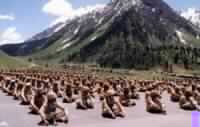HIGHLIGHTS: India Rules Out Face-to-Face MusharrafVajpayee Meeting in Almaty||Russian President Putin Will Separately Meet With the Two Leaders||Musharraf Believes Nuclear Option is Unthinkable||STORY: The leaders of India and Pakistan fly to central Asia on Sunday for a 16-nation Asian security summit, with Russia hoping to bring them together and avert the threat of war in the sub-continent. (Read photo caption)
India has said Prime Minister Atal Behari Vajpayee would raise what he calls Pakistani-sponsored "cross-border terrorism" during the three-day meeting opening on Monday in Almaty, the commercial capital of Kazakhstan.
But India also ruled out a face-to-face meeting between Vajpayee and Pakistan's military ruler, General Pervez Musharraf.
The two men last met for a tense handshake and exchanged a few words at a South Asian summit on Kathmandu in January.
The two nuclear-armed nations now have around a million men facing each other across their border, with the international community scrambling to avert war over disputed Kashmir.
RUSSIAN MEDIATION
Russia's Deputy Foreign Minister Alexander Losyukov was quoted last week as saying President Vladimir Putin would have separate talks with Vaypayee and Musharraf and persuade them to "put confrontation in the past."
Losyukov admitted difficulties in bringing the two foes together but said Putin's aim was to "facilitate dialogue."
MUSHARRAF BELIEVES NUCLEAR OPTION IS UNTHINKABLE
In Islamabad, Musharraf sought on Saturday to ease fears that the standoff with India would lead to nuclear conflict, saying the nuclear option was unthinkable.
As the United Nations prepared to evacuate families of its staff from Pakistan, he said in a television interview: "I don't think either side is that irresponsible to go to that limit."
"I would even go to the extent of saying one shouldn't even be discussing these things, because any sane individual cannot even think of going into this unconventional war, whatever the pressures," he told CNN.
NO SIGNS OF MASS EXODUS OF FOREIGN NATIONALS FROM SUB-CONTINENT
The United States, Britain and other Western nations have flown home diplomats and their families from India and Pakistan and urged tens of thousands of their citizens to leave.
But there was no sign of a mass exodus of foreign nationals from India, despite the travel warnings.
BLOODSHED ON LINE OF CONTROL
One civilian was killed and 24 people wounded in two grenade attacks in Indian Kashmir on Saturday. They followed two similar assaults on Friday. India blames the attacks on militants armed and trained by Pakistan who are fighting Indian rule in the disputed Himalayan region.
PHOTO CAPTION
Pakistani soldiers listen to General Muhammad Yusaf Khan (not shown), the Vice Chief of Army Staff, as he speaks to troops deployed at a forward location on the Pakistan-India border on June 1, 2002. India and Pakistani troops exchanged fresh trailery and mortar fire across their frontier in Kashmir on Saturday as global pressure mounted on the nuclear-armed foes to avert war, an Indian defense official said. REUTERS/Pakistan Military Department/Handout
- Author:
& News Agencies - Section:
WORLD HEADLINES


 Home
Home Discover Islam
Discover Islam Quran Recitations
Quran Recitations Lectures
Lectures
 Fatwa
Fatwa Articles
Articles Fiqh
Fiqh E-Books
E-Books Boys & Girls
Boys & Girls  Hajj Rulings
Hajj Rulings Hajj Fatwas
Hajj Fatwas














